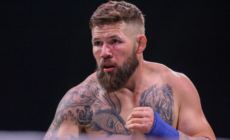-
Neighbors Find Dog Tied Up to a Tree, by Evening ‘They Knew’ the Truth - 23 mins ago
-
Did fires destroy your home? California may have relief money for you - 37 mins ago
-
Agents Use Military-Style Force Against Protesters at L.A. Immigration Raid - 40 mins ago
-
How to Watch BKFC 75 Albuquerque Mundell vs. Sanchez: Live Stream BKFC, TV Channel - 58 mins ago
-
Buildup to a Meltdown: How the Trump-Musk Alliance Collapsed - about 1 hour ago
-
Orioles Reunite With Veteran Reliever In Trade With Braves - 2 hours ago
-
Washington Nationals Nike Air Max 270 Sneakers: How to Buy MLB City Connect Shoes - 2 hours ago
-
Sunny Jacobs, a Celebrity After Freed From Death Row, Dies at 77 - 2 hours ago
-
Mayor Bass taps AECOM to assist with Palisades rebuilding - 3 hours ago
-
Booger McFarland’s Bold Take on Commanders’ Jayden Daniels - 3 hours ago
Commentary: Hegseth’s move on USNS Harvey Milk is a stain on military’s ‘warrior ethos’
Of course, Trump’s Secretary of Defense wants the name of Harvey Milk, the murdered gay rights pioneer, stripped from a ship.
Never mind that Milk served in the Korean War as a diving instructor, eventually discharged because of his sexual orientation. Or that he had exhibited courage in facing down haters as the nation’s first publicly out elected official. After all, when Pete Hegseth’s not sending confidential war plans via Signal to people who shouldn’t be privy to them, he’s busy bloviating about the “warrior ethos.”
Hegseth is a military veteran, a National Guardsman who did tours in Iraq and Afghanistan. But he’s also someone who has made a career out of telling Americans he, above everyone else, knows what our veterans need and what our armed forces need to defend the U.S. in an increasingly volatile world. So Hegseth may know something about warriors and fighting. So did Milk.
But Hegseth is too busy playing Rambo to recognize it. Instead, he’s weaponizing bigotry to remake the U.S. military as a scorched-earth, hetero-Christian outfit ready to stamp out liberal heretics here and abroad. That’s not befitting anyone who calls themselves a warrior, no matter how many pseudo-patriotic tattoos and American flag items of clothing Hegseth loves to sport.
A true warrior follows a code of honor that allows respect to those they disagree with and sometimes even combat. For Hegseth to specifically ask that the USNS Harvey Milk have its name changed during Pride Month — the same month that he’s requiring all trans service people to out themselves and voluntarily leave their positions or be discharged against their will — does not represent the “reestablishing [of] the warrior culture” that the Navy is citing as the reason for the moves.
Instead, it reveals Hegseth’s Achilles heel, one he shares with Trump: a fundamental insecurity about their place in a country that diversified long ago.
CBS News is also reporting the Navy is recommending the renaming of ships named after civil rights icons Medgar Evers, Cesar Chavez, Sojourner Truth and Lucy Stone along with ships that haven’t yet been built but are scheduled to bear the names of Dolores Huerta, Thurgood Marshall, Ruth Bader Ginsburg and Harriet Tubman.
Pentagon spokesperson Sean Parnell gave my colleague Kevin Rector the same malarkey he’s giving the rest of the media when asked for comment about this matter: That Hegseth is “committed” to making sure all named military assets “are reflective of the Commander-in-Chief’s priorities, our nation’s history, and the warrior ethos.”

Marine Col. Alison Thompson, left, talks with Jenn Onofrio, center, a White House Fellow to the secretary of the Navy and Patrik Gallineaux, right, of the Richmond/Ermet Aid Foundation prior to the launching of the USNS Harvey Milk, a fleet replenishment oiler ship named after the first openly gay elected official in 2021 in San Diego.
(Alex Gallardo / Associated Press)
I can understand the argument can be made that naval ships should be named only after those who served, which would eliminate people like Huerta, Ginsburg and Truth. But there was a beauty in the idea of having the names of civil rights heroes adorn ships in the so-called John Lewis class, oilers named after the late congressman. It was a reminder that wars don’t just happen on the front lines but also on the home front. That those who serve to defend our democracy don’t just do it through the military. That winning doesn’t just happen with bullets and bombs.
That sometimes, the biggest threat to our nation hasn’t been the enemy abroad, but the enemy within. It’s not just my wokoso opinion, either — the oath that all Navy newcomers and newly minted officers must take have them swear to “support and defend the Constitution of the United States against all enemies, foreign and domestic.”
You might not associate Huerta, Truth, and Marshall with the military — indeed, I was surprised the Navy had honored them, period. But I and millions of Americans do remember them for fierceness in their respective battlegrounds, a steeliness any sailor should aspire to. For anyone in Hegseth’s world to even think about erasing their name is a disgrace to the Stars and Stripes — but what else should we expect from a department whose boss evaded military service by claiming to have debilitating bone spurs?
The striking of Milk’s name from an oiler, and proposed renaming of dry cargo ships named for Evers and Chavez, is particularly vile.
Milk joined the Navy in the footsteps of his parents. He was so proud of his military background that he was wearing a belt buckle with his Navy diver’s insignia the night he was assassinated. Evers was inspired to fight Jim Crow after serving in a segregated Army unit during World War II. Chavez, meanwhile, was stationed in the western Pacific shortly after the Good War during his two-year Navy stint.
I called up Andres Chavez, executive director of the National Chavez Center and grandson of Cesar, to hear how he was feeling about this mess. Andres was there in 2012 when the USNS Cesar Chavez was launched in San Diego, christened with a champagne bottle by Helen Chavez, Cesar’s widow and Andres’ grandmother. He said “it was probably the second-most memorable commemoration I’ve seen of my Tata after Obama” dedicated the Cesar E. Chavez National Monument in the Central Valley that year.
The USNS Cesar Chavez was the last of the Navy’s Lewis and Clark class of boats, all named after pioneers and explorers. Andres said his family was initially “hesitant” to have a naval ship named in honor of their patriarch “because so much of Cesar’s identity is wrapped up in nonviolence” but accepted when they found out the push came from shipyard workers from San Diego’s Barrio Logan.
“And there’s been so many Latinos who have served in the military in this country, so we accepted on behalf of them as well,” he said.
The Chavez family found out about the possibility of the USNS Cesar Chavez losing its name from reporters.
“We’re just gonna wait and see what’s next, but we’re not surprised by this administration anymore,” Andres said. “It’s just not an affront to Cesar; it’s an affront to all the Latino veterans of this country.”
He pushed back on Hegseth’s definition of what a warrior is by bringing up the work of his grandfather and Milk. The two supported each other’s causes in the 1970s and met “numerous” times, according to Andres.
“They served by creating more opportunities for other people and fighting for their respect,” he concluded. “That’s the definition of a warrior.”
Source link
















